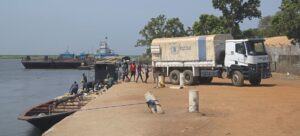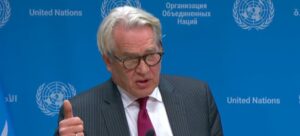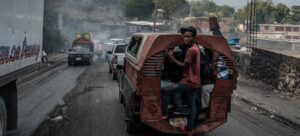“Failure to make progress towards a two-State solution will only increase volatility and risk for hundreds of millions of people across the region, who will continue to live under the constant threat of violence,” he said.
Regional conflict, global impact
With the Middle East “on a precipice”, he appealed for maximum restraint, warning against the far-reaching consequences.
“One miscalculation, one miscommunication, one mistake, could lead to the unthinkable – a full-scale regional conflict that would be devastating for all involved – and for the rest of the world,” he said.
Mr. Guterres reiterated his strong condemnation for Iran’s large-scale attack on Israel on Saturday, and an earlier assault on the Iranian consulate in Damascus which Tehran attributed to Israel, saying “it is high time to end the bloody cycle of retaliation.”
End Gaza hostilities
Stressing that the international community must work together to prevent any actions that could push the entire Middle East over the edge, he highlighted the need for diplomacy that would lead to de-escalation, starting with Gaza.
“Ending the hostilities in Gaza would significantly defuse tensions across the region,” Mr. Guterres said, repeating his call for an immediate humanitarian ceasefire and the immediate release of all hostages held in the enclave.
“The horrific terror attacks by Hamas and other Palestinian armed groups on 7 October, including mass killings, the use of sexual violence, torture, and the taking of hostages, were an intolerable denial of the most basic values of humanity, and a breach of the most fundamental rules of international law,” he added.
‘Humanitarian hellscape’
Meanwhile, nearly seven months of Israeli military operations in Gaza “have created a humanitarian hellscape”. Tens of thousands have been killed, including more than 13,800 children, and two million Palestinians are now living under the threat of famine.
Israel recently made several commitments to improve aid delivery, he said. For example, three convoys from the World Food Programme (WFP) were authorized to use the Erez Crossing into northern Gaza to deliver food parcels and wheat flour over a three-day period this week.
Yet, “apparent progress in one area is often cancelled out by delays and restrictions elsewhere”, meaning that “the impact is limited, and sometimes nil.”
‘Quantum leap’ in aid
The Secretary-General called for “a quantum leap in humanitarian aid” to avert imminent famine in Gaza, and further preventable deaths from disease.
Conditions on the ground must also be addressed so that humanitarian agencies can safely deliver aid, he added, noting that nearly 250 aid workers have been killed, including more than 180 UN personnel.
“Delivering aid at scale requires Israel’s full and active facilitation of humanitarian operations, including through a functioning humanitarian notification system – and improved and direct communications between humanitarians and military decisionmakers on the ground,” he said.
West Bank violence
Mr. Guterres also highlighted “the explosive situation” in the occupied West Bank. More than 450 Palestinians, including 112 children, have been killed since 7 October. Seventeen Israelis, including a child, have also been killed there and in Israel during the same period.
Additionally, the reported killing of a 14-year-old Israeli boy over the weekend sparked a new wave of armed settler attacks against at least 37 Palestinian villages. Four Palestinians were killed, including a 17-year-old boy.
“The backdrop to this appalling surge in violence is the continued expansion of Israeli settlements – in themselves a violation of international law – and repeated large-scale Israeli operations in Palestinian areas,” he said.
Condemning the violence, Mr. Guterres urged Israel to take immediate steps to end the unprecedented levels of settler violence, hold perpetrators to account, and protect the Palestinian population from attacks, violence and intimidation.
Blue Line, Red Sea
Efforts towards regional de-escalation must also address the extremely fraught situation in Lebanon, particularly along the Blue Line which marks the frontier between the south of the country and northern Israel, Mr. Guterres continued.
“Exchanges of fire between Israeli forces and Hezbollah are exacting a mounting toll on civilian communities in Israel and Lebanon. Dozens of civilians have been killed and tens of thousands displaced on both sides of the Blue Line,” he said, appealing for restraint.
He also drew attention to the crisis in the Red Sea, where Houthi rebels in Yemen continue to launch attacks against merchant and commercial ships, disrupting global trade.
He urged the international community to unite to prevent escalation in the Red Sea, adding that the people of Yemen must be supported in their efforts towards a just and sustainable peace.
Ziad Abu Amr, Special Representative of the President of the State of Palestine, addresses the Security Council meeting on the situation in the Middle East, including the Palestinian question.
Palestine: Support full UN Membership
The Special Representative of the Palestinian President, Ziad Abu Amr, said the plight of the Palestinian people started over a century ago and is still ongoing.
“We are still longing to practice our right to self-determination to live in freedom, security and peace in an independent State, similar to other countries around the world. We have made and continue to make great sacrifices to achieve this goal,” he told the Council.
He said granting Palestine full membership at the UN will lift some of the historic injustices that succeeding generations of Palestinians have been subjected to.
The decision will also be an important pillar to achieve peace in the region because the Palestinian-Israeli conflict in its different dimensions now extends beyond the borders of Palestine and Israel and impacts other parts of the Middle East and the world.
“Therefore, we believe that it is high time for the Security Council to shoulder its historic responsibility to give justice to the Palestinian people by adopting a resolution to accept Palestine as a full member of the United Nations,” he said.
“Those who are trying to disrupt and hinder the adoption of such a resolution, they are not helping the prospects of peace between Palestinians and Israelis and the prospects for peace in the Middle East in general,” he added.
Council due to vote on Palestinian membership
The Security Council is due to vote in just a few hours’ time in New York on whether to recommend Palestine for full membership, which if approved, would then go to the wider General Assembly. Read our full explainer here on Palestine’s decades-long bid.
Turning to Gaza, Mr. Abu Amr said the comprehensive war waged by Israel has claimed the lives of over 35,000 Palestinians and wounded 80,000, mostly women, children and the elderly, and the majority of the enclave has been destroyed.
“Gaza will come back. What will be destroyed is the occupation,” he said.
“We call on you today more than ever, to swiftly intervene and take the necessary measures to compel Israel to put an end to its aggression, to allow the delivery of humanitarian assistance to a starving people, to immediately withdraw from the Gaza Strip, to comply with international law and the resolutions of international legitimacy.”
Ambassador Gilad Erdan of Israel addresses the Security Council meeting on the situation in the Middle East, including the Palestinian question.
A ‘sick reward’: Israel
Israeli Ambassador Gilad Erdan chastised the Council for not meeting even once to discuss ways to advance the release of the hostages held in Gaza or issuing condemnations against the “heinous 7 October massacre” by Hamas.
“Rather than condemning Hamas’s atrocities or taking action, real action, to bring our hostages home, this Council will be voting upon a resolution to recommend granting the Palestinian Authority full membership status,” he said.
He stated that the resolution will have zero positive impact for any party, cause destruction for years to come and harm any chance for future dialogue.
Mr. Erdan said six months after the most brutal massacre of Jews since the Holocaust, the Security Council was seeking to reward the supporters and perpetrators with Statehood.
“The child-murdering Hamas rapists are watching this meeting and they are smiling. There is no bigger prize for terror than today’s meeting,” he said.
He also listed the criteria for admission to the UN, whose membership is open to all peace-loving States.
“The Palestinian Authority has absolutely no control over Gaza. You all know it; everyone knows it,” he said. “So, who is the Council voting to recognize today and give full membership status to: Hamas in Gaza? Palestinian Islamic Jihad in Nablus? Who is going to be in charge?”
He said that while this alone “is grounds enough to reject this sick reward for Palestinian terror,” the Palestinian Authority “is the opposite of a peace-loving entity” as it has not condemned the 7 October attacks.
Ambassador Robert A. Wood of the United States addresses the Security Council meeting on the situation in the Middle East, including the Palestinian question.
New US sanctions on Iran
United States Deputy Permanent Ambassador Robert Wood condemned Iran’s direct attack on Israel, which his country had helped to foil.
“It is vital that the international community is united in condemning Iran’s reckless escalatory acts, which pose a direct threat to international peace and security, destabilize the region, and endanger its own people,” he said.
In response, the United States announced new sanctions against several officials connected to Iran’s drone programme, as well as suppliers and customers of one of its largest steel producers, and automobile companies.
The Security Council must also not let Iran’s actions go unanswered, he continued.
He said evidence is clear that Iran has armed militant group Hezbollah. It has also armed, facilitated and enabled Houthi attacks on Saudi Arabia, the United Arab Emirates, and on vessels in the Red Sea, all in clear violation of Council resolutions.
Additionally, Iran has transferred Shahed one-way attack drones used in attacks against multiple UN Member States.
“Iran has provided significant funding and training for the military wing of Hamas, which as we know, perpetrated unspeakable acts of cruelty on October 7 against Israelis, Americans, and citizens from countries all over the world. This longstanding Iranian support continues to contribute to the current crisis in Gaza,” he added.
Meanwhile, the US continues to work towards an immediate and sustainable ceasefire in Gaza, he said, as part of a deal to release the hostages and deliver additional, increased humanitarian aid to Palestinian civilians.
Mr. Wood noted that his country is committed to achieving credible, timebound, and irreversible steps toward a two-State solution between Israelis and Palestinians.
Foreign Minister Hossein Amir-Abdollahian of Iran addresses the Security Council meeting on the situation in the Middle East, including the Palestinian question.
Iran: Israel attack ‘necessary’
The Foreign Minister of Iran, Dr. Hossein Amir-Abdollahian, said the 1 April attack on the country’s embassy in Damascus showed yet again that Israel does not hesitate to violate the fundamental immunity of diplomatic premises and personnel.
He regretted that the Council had not taken any action in response to Iran’s official and repeated requests to prevent further Israeli attacks on its interests.
Iran recently had also shown considerable restraint, he added, but “was faced with the continuation of the White House’s green light granted to the Israeli regime as well as the continued inaction of the Security Council in preventing these attacks.”
Therefore, the attack on Israel last weekend “was first and foremost necessary, because Iran had no other option,” he said, adding that operations focused solely on two Israeli military bases used in the embassy attack.
“Iran’s legitimate defence and countermeasures have been concluded. Therefore, the terrorist Israeli regime must be compelled to stop any further military adventurism against our interests,” he said.
Mr. Amir-Abdollahian assured the Council of Iran’s commitment to promoting regional peace and stability.
He said the Council “must compel the rogue and rebel regime of Israel to immediately stop the war and genocide in Gaza.”



















